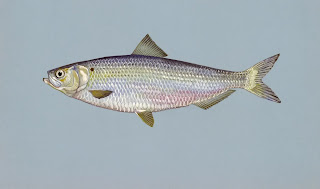Herring
"Mr. Brent told us that in the mid 1950's, he would catch bushels of river herring (with a dip net) from the portion of Potomac Creek between the Route 627 bridge (stream mile 12.5) and the site of the Abel Lake Dam (stream mile 13.2)... M.J. Morgan told us that most river herring runs during a given spawning season no longer extend upstream beyond [the railroad bridge]; however, on one or two days out of the spawning season, some river herring continue upstream at least as far as the Route 626 bridge, but not in sufficient numbers to attract fishermen."
From a 1988 report by Virginia Tech's Department of Fisheries and Wildlife Sciences (p. 90).
Old-time residents often fish and swim Stafford County waterways in blue jeans. This behavior can make them stick out in a world of pricey, moisture-wicking fabrics. Shirts are optional gear, too.
Once, fishing off a sunny river dock, I spoke with two pole-carrying young men who were moving deliberately along the river bank, searching for catfish. The bank was muddy and very slick. To my mind it was unpassable, completely overgrown with late summer vines and the types of tangled bushes and unpromising saplings arborists call “trash trees.” Yet the men’s pursuit was loud and perfectly joyous. One wore a t-shirt and jeans, the other jeans with no shirt. Both had dark lines of wet mud up to their chests. They showed no fatigue, no concern for the heat, humidity, biting insects, abundant poison ivy; they passed the dock speaking only of “getting on” good fish. It was a remarkable moment in my own angling experience: here, embodied, was the mania behind so many thumb-worn collections of short stories and fishing memes. This mania is tangible. Surely, all peoples who have lived on Potomac Creek have witnessed its power.
Woods and creeks speak directly to young people drawn to questioning scat and what lies beneath topsoil. I have two boys here on Potomac Creek, and was of course one myself. One springtime, my friend and I netted spawning herring by the bucket. We pulled them up from the Creek’s channels with neither limit nor license. Boastfully, we showed our bounty to Mr. Young, the cornfield farmer, who offered five cents per fish in future catches. We returned to the Creek the next day. Chicken wire nets in hand, we filled plastic trash cans with silver fish. Hours later Mr. Young looked over the hundreds of herring, to which he said “I’ll pay two cents each.” We were angry and refused to sell. My mother made us clean them all. This chore annoyed us but made a bit more sense than throwing them away. Boys like us are one reason herring are now all but gone from the Creek, and illegal to possess.
Who knows which days in the woods will be written about forty years later?
 |
| Source: Wikimedia |




Comments
Post a Comment